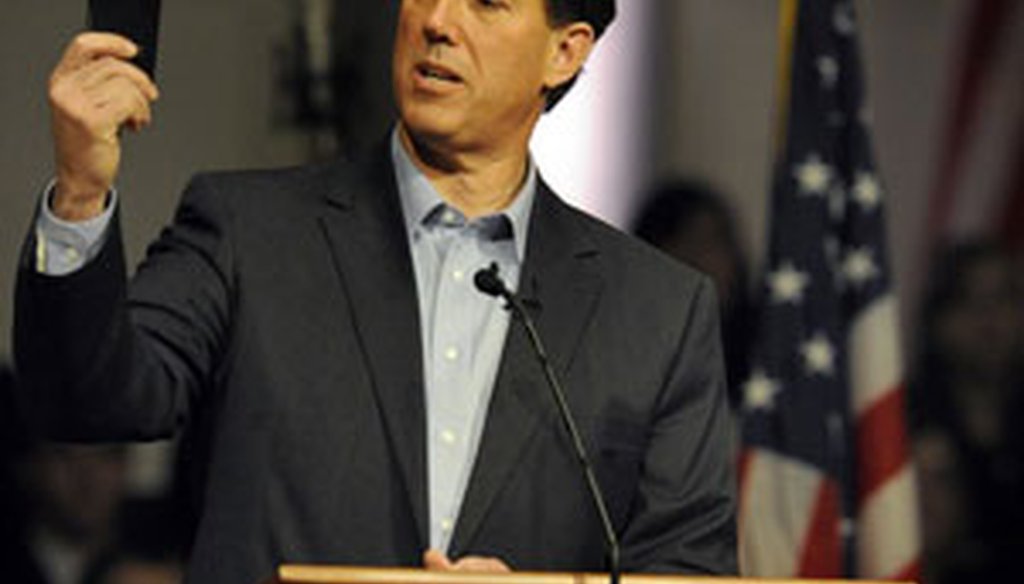Get PolitiFact in your inbox.

Rick Santorum holds up his pocket copy of the Constitution during a Rally for Rick at Temple Baptist Church in Powell, Tenn., Feb. 29, 2012. (MICHAEL PATRICK | Knoxville News Sentinel)
This is taken from a PolitiFact.com article that was the second in an occasional series fact-checking the speeches of the presidential candidates. The first involved a speech Mitt Romney made in Nevada on Feb. 4.
Rick Santorum held up a pocket-sized copy of the Constitution before about 2,500 people gathered at Temple Baptist Church near Knoxville, Tenn.
The document is the "operator’s guide to America," he told them, central for Americans along with the Declaration of Independence.
"You really can't have one — and understand the country — without the other."
It was a preview of things to come in the Republican presidential candidate’s hour-long speech Feb. 29, 2012, which touched on details of health care law, energy policy and government benefits, but returned to themes of life, liberty and the pursuit of happiness.
"This race must be about big things," Santorum said later. "It must be about who we are at our core."
His speech, less than a week before Super Tuesday wins in North Dakota, Oklahoma and Tennessee, included stock lines we had checked before, and some we hadn’t. We put the claims to the Truth-O-Meter as part of our continuing series fact-checking the stump speeches of the presidential candidates. (We checked Mitt Romney’s speech in Nevada in February.)
Santorum’s focus on the nation’s core principles got off to a scholarly start, with a definition of "happiness" in the Declaration of Independence.
"If you look up the dictionary definition of happiness at the time of our founders … happiness was not doing what you want to do but doing what you ought to do," he said.
We took him up on that — checking two dictionaries that would have been in author Thomas Jefferson’s library and one published after the fact with historical references — and found no such mention.
We read work by philosopher John Locke, which formed the basis for founders’ push for freedom from the British empire, that might be read as supporting part of Santorum's claim. But Locke went on to say that happiness means different things to different people. And historians told us that the notion that happiness means doing your duty or "doing what you ought to do" ran counter to Jefferson's nature and to the nature of other founders. We rated Santorum’s claim Mostly False.
From his discussion of life, liberty and happiness, Santorum took up government policies he says infringe on Americans’ freedoms, such as the 2010 health care law referred to by Republicans as "Obamacare," which will require most Americans to buy health insurance.
Consumers and free markets should have the power to run the health care system, not the government, Santorum said.
The government "tells health insurance companies how much money they're allowed to keep of what they receive in revenues — 15 percent," he said.
We checked, and Santorum’s description of the medical loss ratio provision of the health reform law doesn't tell the whole story. The rule does require large group insurance plans to spend 85 percent of their premium income on real health care. For small group plans the rule is more generous. All health insurance companies are still free to spend other streams of revenue however they wish, and several types of expenses are specifically exempted from the 15 (or 20) percent limit.
Santorum’s statement left out a good deal of important information. We rated it Half True.
He continued on the theme of government intervention, claiming it also drives up energy prices. Gas prices are up under a president who doesn’t believe in carbon fuels, he said.
"This is the politicization of science," Santorum said. "... We put the Earth above the needs of man."
He claimed President Barack Obama shut down new oil and gas drilling.
"This is a president ... who has shut down federal permitting for all of those activities, offshore, on federal lands, imposes it in Alaska and the deepwater," he said.
We checked a similar claim from Santorum in June 2011, that Obama "has put (up) a stop sign … against oil drilling, against any kind of exploration offshore or in Alaska."
It’s true that the Obama Administration pulled back the reins after the BP oil spill in 2010, which released millions of barrels of crude oil into the Gulf of Mexico. But the administration continued approving shallow-water wells, and it began to approve deepwater wells again after a moratorium was lifted.
"None of this could be accurately even remotely characterized as a ‘stop sign,’" Richard Charter of Defenders of Wildlife told PolitiFact in 2011. We rated that claim by Santorum as False.
Santorum said he never "bought into" the fight against global warming "when it was the popular thing to be for." As president, he said, he would have the courage to speak up against falsehoods, he said, including from the elite media, and say, "No, that’s not true." (PolitiFact has found there is significant scientific consensus that human beings are contributing to global warming.)
Santorum also said he would stand up and fight to balance the budget, but he wouldn’t cut defense spending. It’s the No. 1 responsibility of the federal government, yet Obama wants to cut it, he said.
"Only 17 percent — we only spent 17 percent of the budget on it, and according to the president, that's too darned much," he said.
Santorum made a similar claim in February in a GOP debate in Mesa, Ariz., saying "When I was born, defense spending was 60 percent of the budget. It's now 17 percent." We rated that claim Mostly True.
The president wants to spend that money instead on programs to increase Americans’ dependency on the federal government, Santorum said — even though Americans don’t want to be dependent.
He used a historical claim to support his point. Immigrants to America left nations "because we didn’t want those countries to take care of us," he said.
"When my grandfather came to this country back in 1925, there were no government benefits," he said.
We checked with a dozen historians and economists and found that there were a number of government benefit programs in America in 1925, from the local to the federal level. We found examples of veterans benefits, workers’ compensation and aid to the poor, widows, the elderly, the blind and mothers and newborns, among other public spending programs. We rated Santorum’s statement as False.
Then he repeated another claim from the Arizona debate, when he had said, "When I was born, less than 10 percent of the federal budget was entitlement spending. It's now 60 percent of the budget."
Santorum was close on the current percentage of the federal budget going to entitlements, but he had understated the figure for his birth year. This makes the expansion, which is dramatic in any case, seem even more so. With one statistic right and one wrong, we rated the claim Half True.
After delving into details, Santorum returned to his "broader vision that appeals to foundational things."
"America is an ideal, an ideal that changed the world," he said.
Who are we at our core, according to Santorum?
We believe in limited government and free people, who will build a great country without looking to the government to provide for them.
"What makes us an American? Is it because we happen to live here in this country? Is that what makes you an American? No. What makes you an American is because you agree with a certain set of values of what America is."
That, we didn’t fact-check.
Our Sources
Knoxville News Sentinel, Rick Santorum speech at Temple Baptist Church in Powell, Tenn., Feb. 29, 2012 (26.8 MB audio file)
Knoxville News Sentinel, "Rick Santorum tells Knox crowd: He'll repeal Obama health-care reforms," Feb. 29, 2012
See links in article for full Truth-O-Meter items.




















































